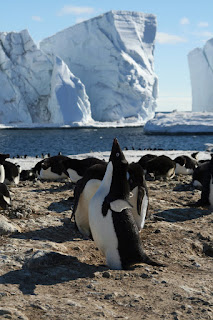




During the summer that I spent working in Antarctica at Scott Base, I got two helicopter trips – a perk that does its rounds through the staff list, so that someone could take advantage of a spare seat if it became available.
Just before I finished my season, I was given a trip to Cape Bird, about 20 minutes flight from the base. Ive always loved helicopters but in a massive army like 212 chopper flying is just so much better! With pristine air and virtually no noise pollution, you can always hear the choppers well before they come into view, which sounds so amazing. There was half a dozen of us that went, taking supplies to the small team of scientists based at the cape, who study the Adelie penguin colony there. We flew right beside the famous Mt Erubus to get to the cape, and though it doesnt look particularly 'mountainous', its massive when you're beside it. We also saw open water!! First time Id see any all summer. I was hoping for sightings of orca whales and the large emperor penguins, but it wasn't to be this day.
What we visited was an Adelie penguin colony. We could have walked along the beach to the colony as soon as we landed, but I was assured by the science team based there that they could show us a way better way, after a coffee and catch up - ok! So it was. We'd had a sharp uphill hike to their 'cabin', which wasnt unlike a typical kiwi bach inside, and when we set off to see the penguins we climbed more and got to the hilltop, and were presented with the most amazing, breath-taking view ever! Pebbly beach, open water, an enormous iceberg sitting just offshore and penguins – penguins, penguins, penguins! The whole beach was a noisy, moving wave of black and white, with the occasional brown of the ever present skuas, the Antarctic's own seagulls. But these guys don't fly in circles over the sea waiting for fish – they are scavenging, opportunistic predators, praying on penguin eggs or young chicks and, protecting their territory from humans! Skua's are partical 'kleptoparasites', they'll chase other birds to 'steal' their catches and the larger Skua's regularly kill and eat other adult birds. They're big, menacing looking and swoop down onto potential threats (like me, walking past them) like the territorial magpie.
Rules state that you're not to approach wildlife in Antarctica, up to about 10metres is fair, but the curious Adelies make sticking to that difficult because they come right up to you to investigate, or you're literally walking amongst them. They're used to human presence because the scientists spend many hours with them, but even those I saw outside Scott Base weren't bothered by human presence at all when we got amongst them with cameras. Adelies are the smallest penguins in Antarctica (about 70cm tall), distinctive with the white rings around their eyes and feathers at the base of the beak, hiding most of the red colour. So called when a French explorer, in the 1830s, named them after his wife. They dont drink water but eat snow, and have a gland in their nose that takes salt out of any sea water they swallow when feeding in the water.
Their nest building and guarding were incredible to watch. They build their nests from small, round pebbles and no penguin is safe from the opportunistic thieving beak that cant walk past an 'easy' stone. And the outcry when the stealing happens!! Its game on to get the stone back! They usually lay eggs in November, which hatch about 35 days later, so visiting in early January meant I saw the odd egg or two, and a couple of tiny chicks – peeking out from under a protective mother. After the female has laid her two eggs, the male then takes over, keeping the eggs warm with either his feet or laying on top of the eggs. During this time the female goes to feed, returning three weeks later to help with the chicks. Parent penguins teach survival to their chicks by making the chicks chase them for food, often only one chick will survive. Of all penguins, Adelie chicks grow the fastest.
We must have spent about 45 minutes on the beach, and it wasn't until the walk back to the helicopter that I had my first experience of a skua attack! Well, I wasn't actually hit by one, but it came close! I so wanted the perfect picture of it coming into swoop, but of course, it was too hard to do, and I ended up flapping my arms about for a break and making a bee-line for the chopper instead.
What an amazing trip to have my last weekend on the ice.
No comments:
Post a Comment